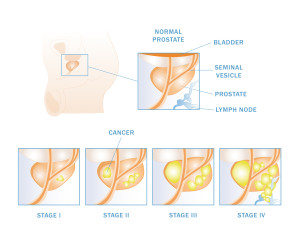When diagnosed with prostate cancer, patients are evaluated based on multiple parameters, including the grade and stage of their cancer. Many people, however, are unaware of what “grading and staging” means, or how these factors are determined by their urologist. When grading a patient’s prostate cancer, urologists determine the aggressiveness of the cancer cells. Staging, on the other hand, determines whether or not the cancer has moved to other parts of the body. By determining the grade and stage or prostate cancer, experts have a better grasp on which treatment options should be used and have a better understand of a patient’s long-term outcomes.
As with all cancers, prostate cancer is best treated when identified early, which is why cancer screenings are so important. To schedule a prostate cancer screening with the experts at Comprehensive Urology, please call (310) 499-2756.
Grades of Prostate Cancer
After diagnosing a patient with prostate cancer, the next step for urologists is to determine the cancer’s grade, which indicates how fast the cancer is growing. In order to do this, urologists grades cancer on a 1 to 5 scale.
Grade 1: This is the lowest grade of prostate cancer. Cancerous tissue in this grade looks nearly identical to healthy prostate tissue.
Grades 2-3: In these grades, some cells looks like normal prostate cells and others don’t. Though patterns vary, the prostate gland can begin to look abnormal, signifying a higher level of aggressiveness.
Grade 4: Grade 4 cancer cells are more aggressive and invasive than those in the lower grades. Cells in these grades may be leaving the prostate and invading surrounding tissue and organs.
Grade 5: This is the most severe of prostate cancer grades. Grade 5 cancer cells appear abnormal, no longer forming the gland-like patterns found in lower stages.
After the prostate cancer is assigned a grade, a patient is assigned a Gleason score, which is determined by adding together the two most dominant grades of cancer in the prostate. For example, if a patient’s dominant cancer type if Grade 5, and his second-most predominant cancer type is Grade 4, that patient’s final Gleason score would be 9, which would be considered a highly-aggressive cancer.
Final Gleason scores are separated into the following categories:
Grades 2-4: Gleason grades 4 and under are the least-aggressive forms of the cancer. They are considered low-grade.
Grades 5-7: Prostate cancer within the grades 5 and 6 are considered moderately aggressive, while those rated grade 7 are moderately aggressive.
Grades 8-10: Prostate cancer within the grades 8-10 are the most aggressive form of the disease.
In determining the prostate cancer’s grade, urologists are better able to provide patients with treatment that is specifically suited to their particular level of cancer.
Stages of Prostate Cancer

When a urologist stages a patient’s prostate cancer, the urologist is determining how much the cancer has spread. Prostate cancer is staged in four levels.
Stage 1: Prostate cancer in stage 1 is limited to the prostate and has not invaded any neighboring tissue.
Stage 2: During stage 2, the prostate cancer has grown and can typically be felt through a digital rectal examination (DRE). Though more advanced than stage 1 cancer, prostate cancer in stage 2 is still contained within the prostate.
Stage 3: Stage 3 is the first stage in which cancer has spread beyond the prostate. Once spread outside of the prostate, there is an increased risk of cancer cells metastasizing in other parts of the body.
Stage 4: The most severe stage, stage 4 prostate cancer has invaded other tissues of the body and may be travelling through a patient’s lymph system.
Regardless of a patient’s grade and stage, the experts at Comprehensive Urology can provide the best and most advanced treatment options available, including robotic surgery, brachytherapy, and more. Remember, even though prostate cancer is the second-most common cancer in men, there are over 2.5 million survivors of the disease.
Contact the Best Urologist in Beverly Hills
If you would like to learn more about the grading and staging of prostate cancer, or if you would like to schedule a screening appointment at our Los Angeles facility, please contact Comprehensive Urology today. With our world-class experience and state of the art equipment, we are dedicated to providing patients with the best prostate cancer treatment possible. Contact us today by calling (310) 499-2756.
Next, read Why You Should Care About Cancer Screenings.